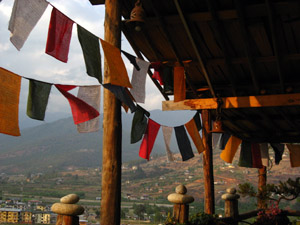 In the villages of Bhutan, life hasn’t changed all that much over the centuries. There’s often no electricity, or bridges over the rivers, and often few roads. There is little currency in circulation. The fields are worked by hand, and Buddhist traditions are deeply revered.
In the villages of Bhutan, life hasn’t changed all that much over the centuries. There’s often no electricity, or bridges over the rivers, and often few roads. There is little currency in circulation. The fields are worked by hand, and Buddhist traditions are deeply revered.
Having had the opportunity to see this remarkably unchanged culture, to feel and see the beauty of the land and people as they are, I wish they would never change. That wish is made from my unthinking, selfish point of view, one that would probably require a certain level of privilege to be maintained for some, and poverty for others. That’s not exactly what I would choose if I were God, but I’d hate to see this beauty, serenity, and spiritual depth, erode.
There is, however, change in the air. Once a path of economic development has been taken to improve the health and education of the people, it often turns into a super highway, rushing along all those on it, or blocking its way.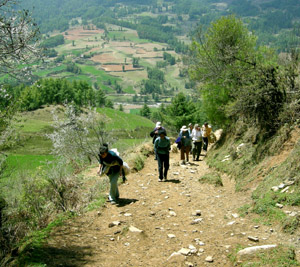
We hiked the final few miles up to an ancient manor house where we were to stay two nights. I would have been happy to stay two weeks, even though there was no electricity, no road, and only wood stoves for heat on these cold, early, spring nights.
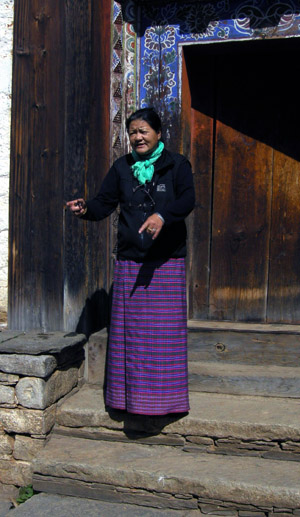 Kunzang Choden, the owner of the Manor, greeted us at its gate. She is one of the most inspiring people I have met anywhere, anytime. The author of seven books, she speaks eloquently about Bhutan to groups in her home, as well as at conferences all over the world. I happened to hear her interviewed on National Public Radio in the US a few months ago. Her novel, “The Circle of Karma” was the first novel written by a Bhutanese to be published. It was short-listed last year for book of the year. Her transformation of the entire main building of the manor house into an extensive folk and cultural museum, allowed us a deeper look at past and present day life in Bhutan. Her work on the educational system for the poorest of the poor and revitalizing the crafts and traditions of Bhutan, earned her the unofficial title of “The Queen” among the common folk throughout the country. She is not in competition with any of the four existing queens of Bhutan however. (Now, there’s a story for later!).
Kunzang Choden, the owner of the Manor, greeted us at its gate. She is one of the most inspiring people I have met anywhere, anytime. The author of seven books, she speaks eloquently about Bhutan to groups in her home, as well as at conferences all over the world. I happened to hear her interviewed on National Public Radio in the US a few months ago. Her novel, “The Circle of Karma” was the first novel written by a Bhutanese to be published. It was short-listed last year for book of the year. Her transformation of the entire main building of the manor house into an extensive folk and cultural museum, allowed us a deeper look at past and present day life in Bhutan. Her work on the educational system for the poorest of the poor and revitalizing the crafts and traditions of Bhutan, earned her the unofficial title of “The Queen” among the common folk throughout the country. She is not in competition with any of the four existing queens of Bhutan however. (Now, there’s a story for later!).
Kunzang spends most of her time in the capital city Thimphu, helping guide the country from a kingdom to a democracy, and beyond. All of this is biographical. It is her presence, generosity, and thoughtfulness which inspired us, and made us not want to leave her side. She speaks in a straightforward, but eloquent, manner, infused with intelligence and humor. Her warmth and personal peace comes from a life of hard work, not privilege, though the family heirlooms in the museum are from generations of royal blood that runs deep on both sides of her family.
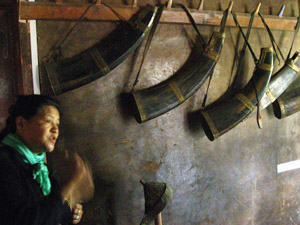 When I asked Kunzang what she sees for the future of Bhutan’s 700,000 people, she said the people see and want things, things that will make life less harsh, from rice cookers to electric light and heat. The kids are leaving the villages for the capital. They want gadgets, cars, and whatever else they see on television. Having electricity means not having to cut and haul trees, chop and stack wood, and build a fire, just to boil water for tea. It means light to read by at night. Developing facilities for education and health care is at the top of the country’s to-do list. The hope is that the Bhutanese will recognize what’s enough and what’s too much. Deep, deep in their training is the concept of “Enough” and that may be their guide through the massive changes brought by the increasingly influential world of materialism. Also deep in Bhutanese training, is recognition we come into this world with nothing and leave with nothing. With that training and
When I asked Kunzang what she sees for the future of Bhutan’s 700,000 people, she said the people see and want things, things that will make life less harsh, from rice cookers to electric light and heat. The kids are leaving the villages for the capital. They want gadgets, cars, and whatever else they see on television. Having electricity means not having to cut and haul trees, chop and stack wood, and build a fire, just to boil water for tea. It means light to read by at night. Developing facilities for education and health care is at the top of the country’s to-do list. The hope is that the Bhutanese will recognize what’s enough and what’s too much. Deep, deep in their training is the concept of “Enough” and that may be their guide through the massive changes brought by the increasingly influential world of materialism. Also deep in Bhutanese training, is recognition we come into this world with nothing and leave with nothing. With that training and 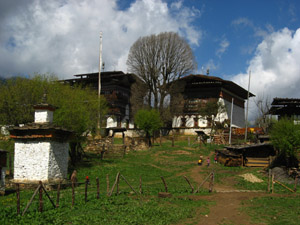 something of the Buddhist concept of “mindfulness,” her hope is the future of Bhutan will be balanced, rather than overrun.
something of the Buddhist concept of “mindfulness,” her hope is the future of Bhutan will be balanced, rather than overrun.
We felt privileged to spend an afternoon touring the museum with Kunzang. She grew up in that manor house and shared her stories, and those of generations of her forefathers, brought to her mind by seeing pieces in the extensive collection of farm implements, kitchen and household tools, and crockery, formal clothing, furniture, and sacred objects. After both of our wonderful dinners, we gathered around the wood stove with Kunzang as she told more tales and answered our questions.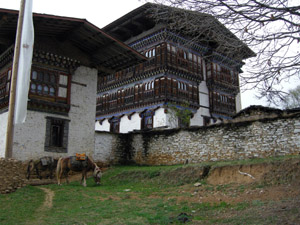 What I found from our time with her was how much I want to contribute something to this unusual land.
What I found from our time with her was how much I want to contribute something to this unusual land.